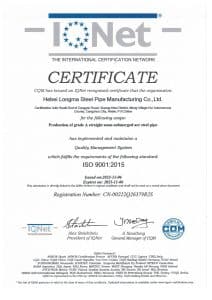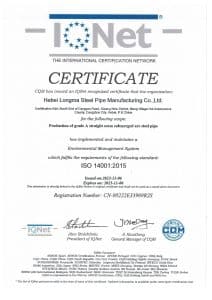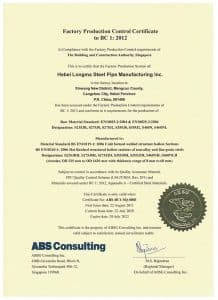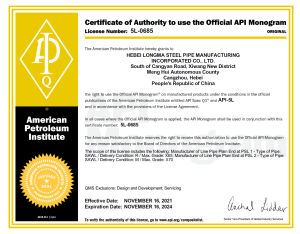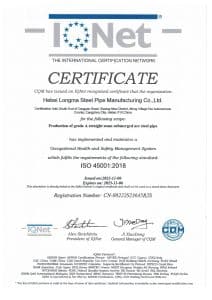Your ASTM A671 EFW Steel Pipe manufacturer in China
Prime quality ASTM A671 CS Fusion Welded Pipe, ASTM A671 Electric Fusion Welded Pipe manufacturer in China. We carry a full inventory of ASTM A671 Pipe products in a variety of sizes to meet the project piping requirements for applications the water, petroleum, oil & gas and other industries. ASTM A671 Pipe Carbon Steel Pipe can be Structural in Nature or used in Fluid, Gas, Oil Transmission. LONGMA produce and stocks ASTM A671 EFW pipes in grades and classes listed on the following.
- Grade: CA55, CB60, CB65, CB70, CC60, CC65, CC70
- Class: 10, 11, 12, 20, 22, 50, 60, 70
- Out Diameter: 406.4-1422mm(16″-56″)
- Wall Thickness: 7.92-50.8mm(0.312″ – 2″)
- Length: 3-12.5 meters
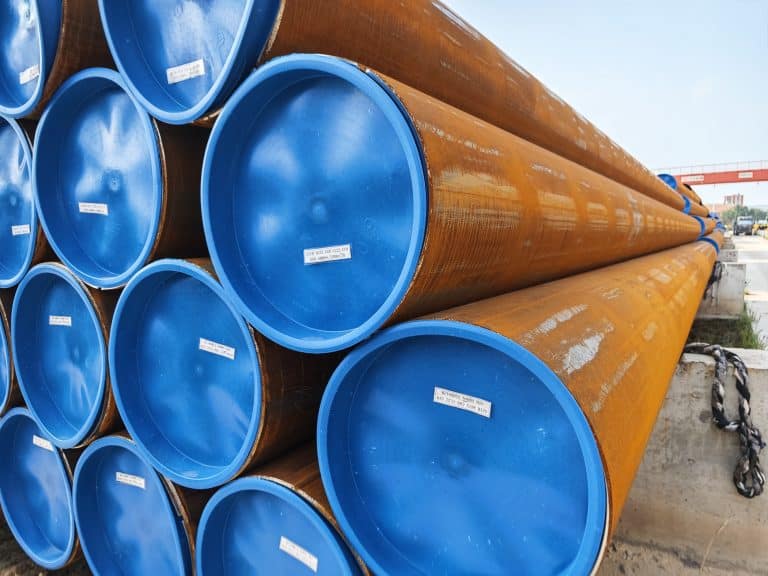
Our Certifications
Our ASTM A671 EFW Steel Pipe Product List
Longma is one of the leading ASTM A671 GR CC60 CC65 CL22 EFW pipes manufacturer since 2003.
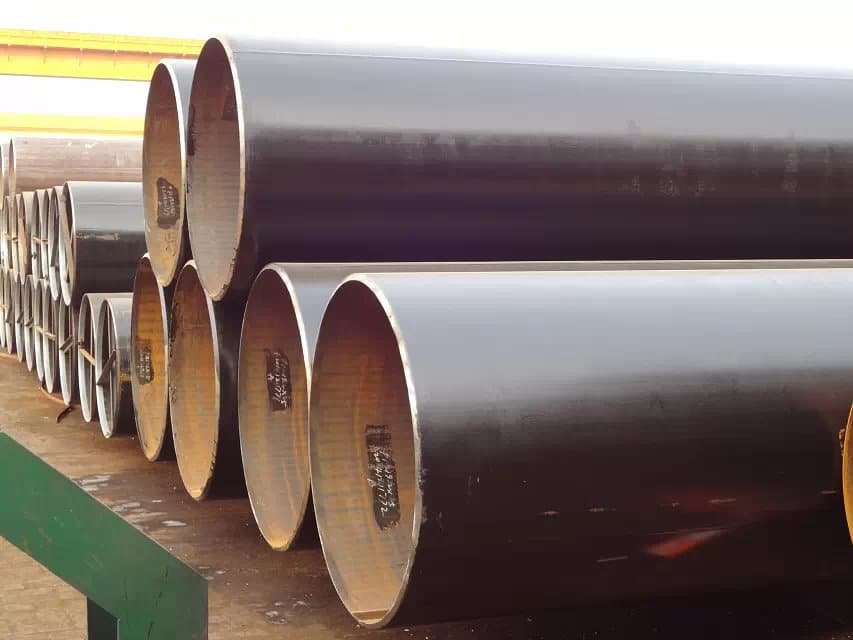
ASTM A671 CC60 Class 22 EFW Steel Pipe
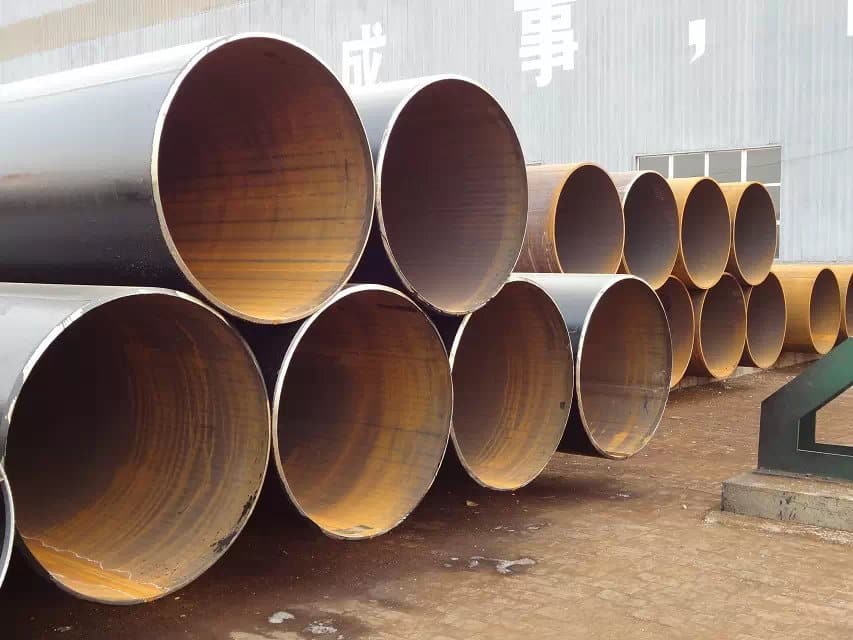
ASTM A671 Carbon Steel EFW Pipe
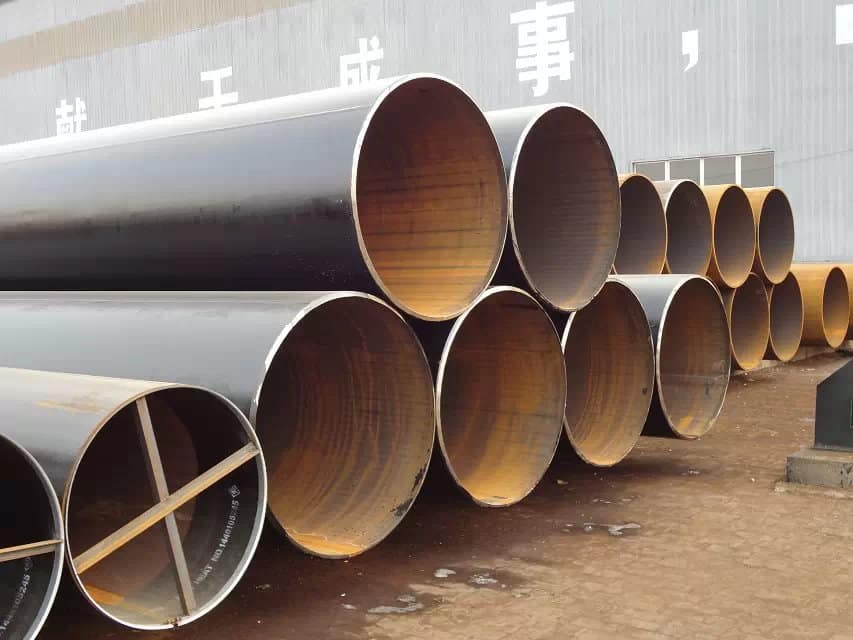
ASTM A671 CC60 CC65 CC70 Pipes
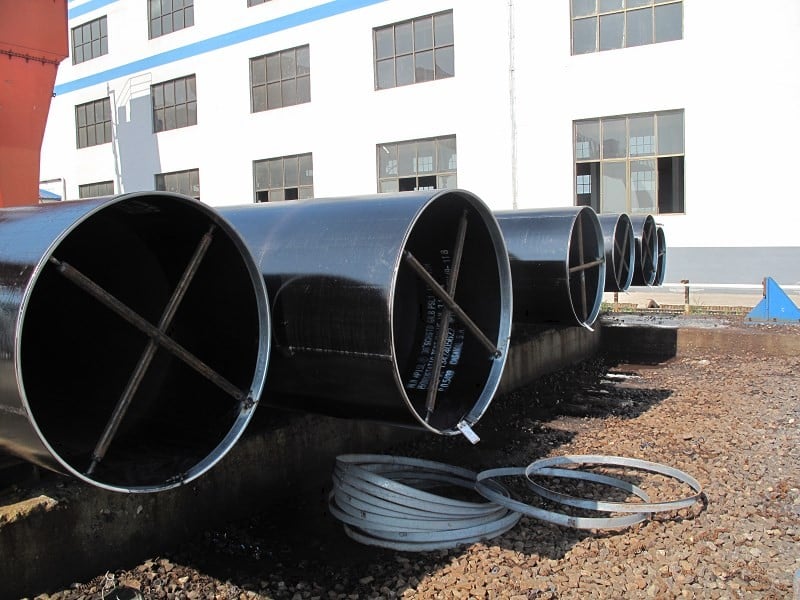
ASTM A671 CC70 CL22 Pipes
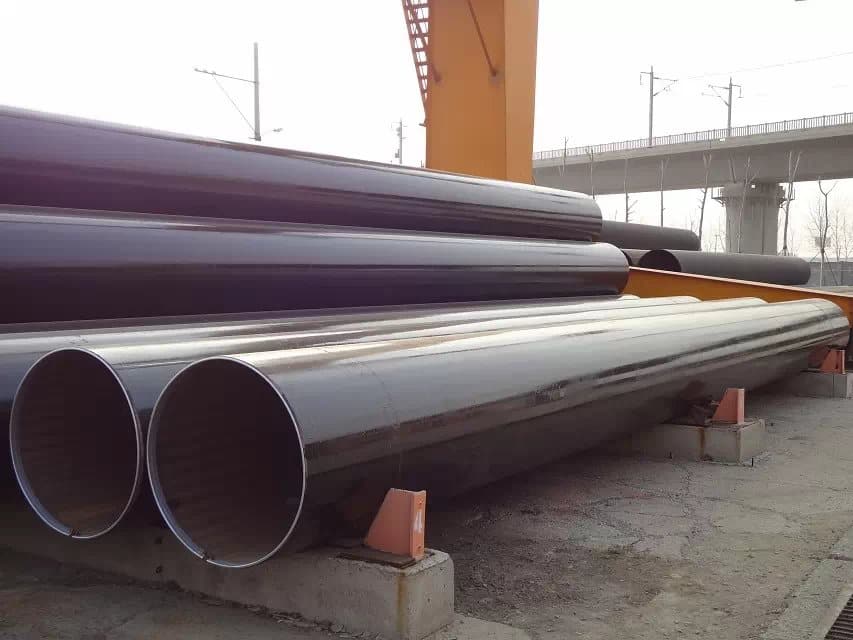
ASTM A671 CC65 EFW Pipes
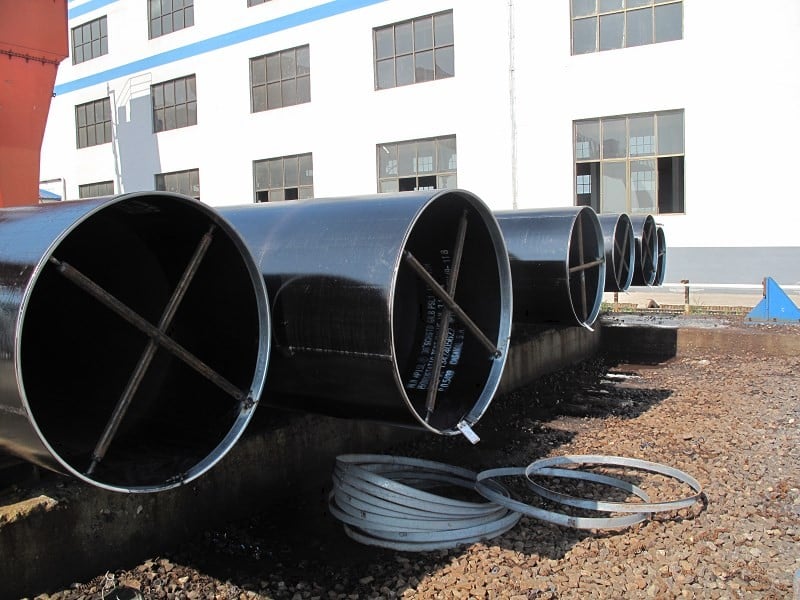
ASTM A671 CF71 CL22 Pipe
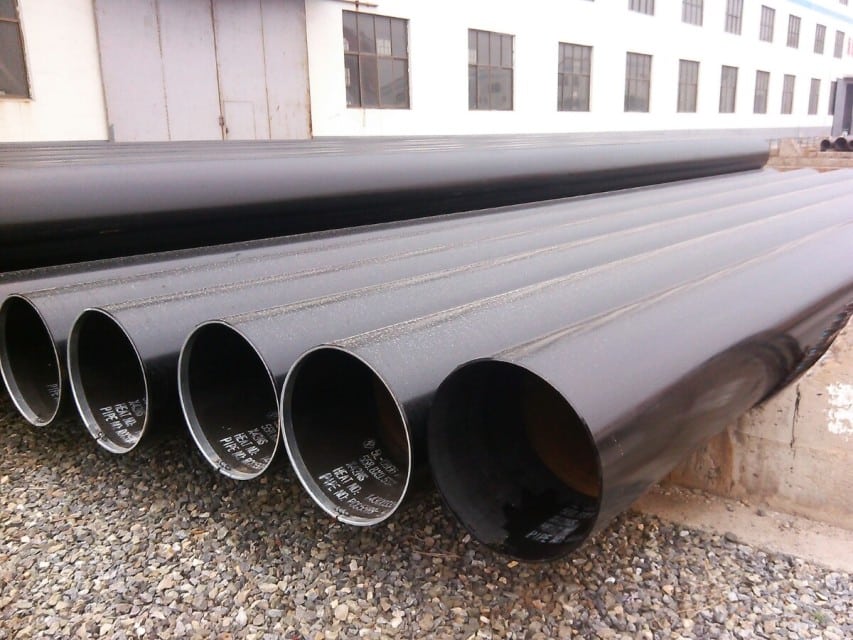
ASTM A671 GR CC60 Pipe Specification
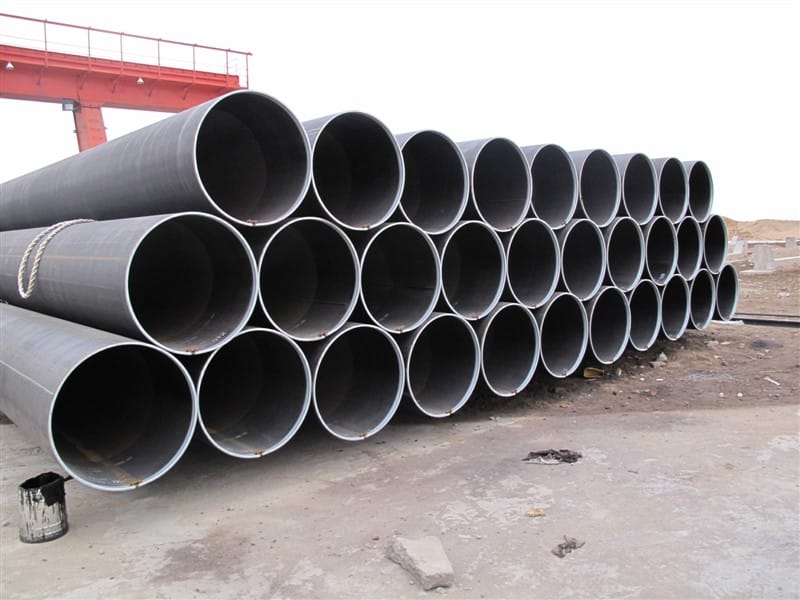
ASTM A671 CC60 Materials
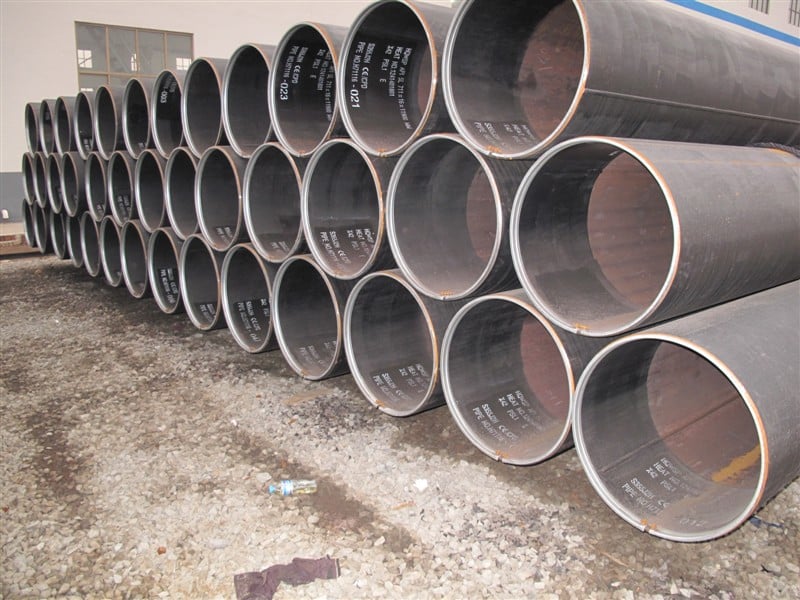
ASTM A671 Pipe Manufacturer
About Longma
- Longma is one of the leading ASTM A671 GR CC60 CC65 CL22 EFW pipes manufacturer since 2003.
- Foundin 2003, specialized in produce ERW, LSAW, DSAW steel pipes with an annual output of 300,000 tons.
- Two factories, 200,000 square meters of plant.
- Advanced production equipment imported from Germany, 16 JCO production lines.
- More than 300 employees and more than 60 technicians provide efficient production operations and technical services.
- API 5L(No. 5L-0685, Expiration date: 16th,Nov,2024), ISO9001, ISO14001, ISO18001, FPC certificates.
- Exports high quality steel pipes to more than 60 countries around the world.
ASTM A671 EFW Steel Pipe Production Line
Annual output of 300,000 tons of LSAW steel pipes, with out diameter Φ406mm- 1626mm (16″ – 64″), wall thickness 6.0mm- 75mm (1/4″ – 3″), length 18 meters max.
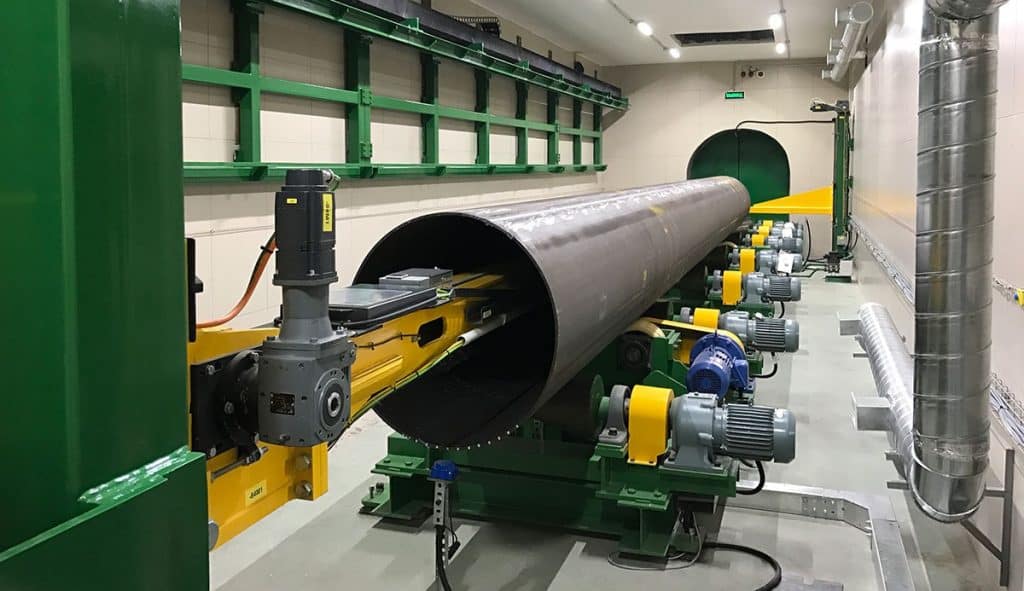
X-Ray Testing
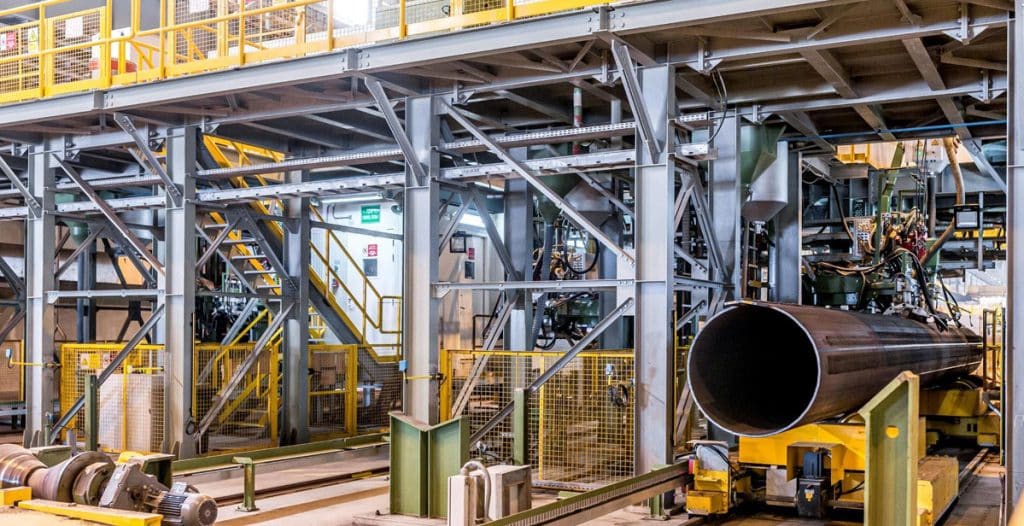
Ultrasonic Testing
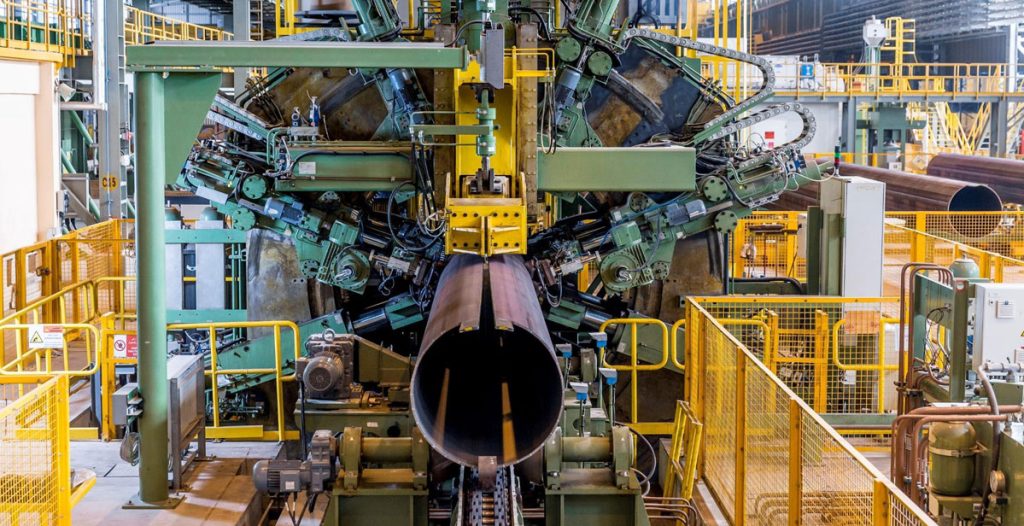
Tack Welding
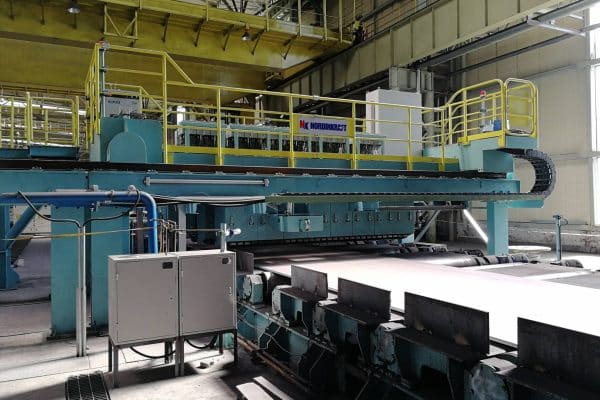
Plate Ultrasonic Testing
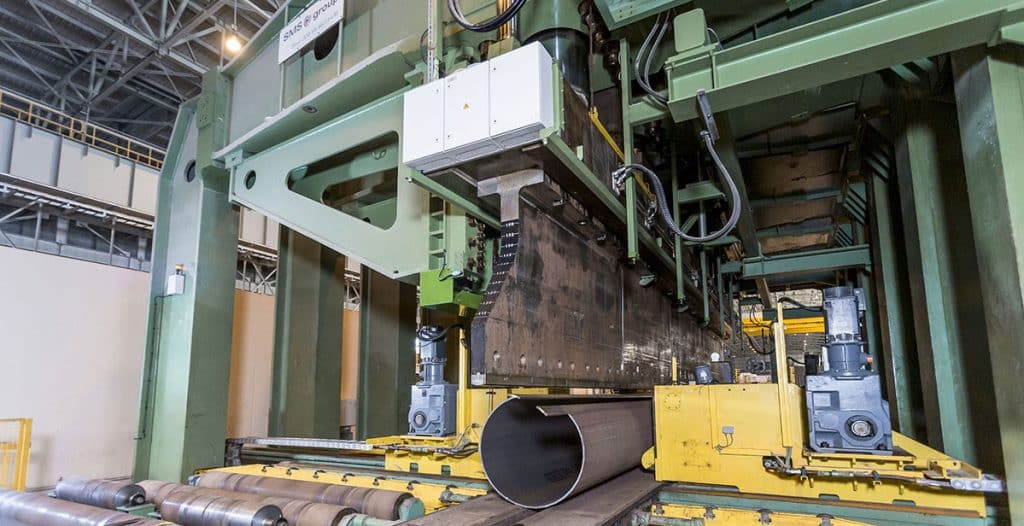
Pipe Forming
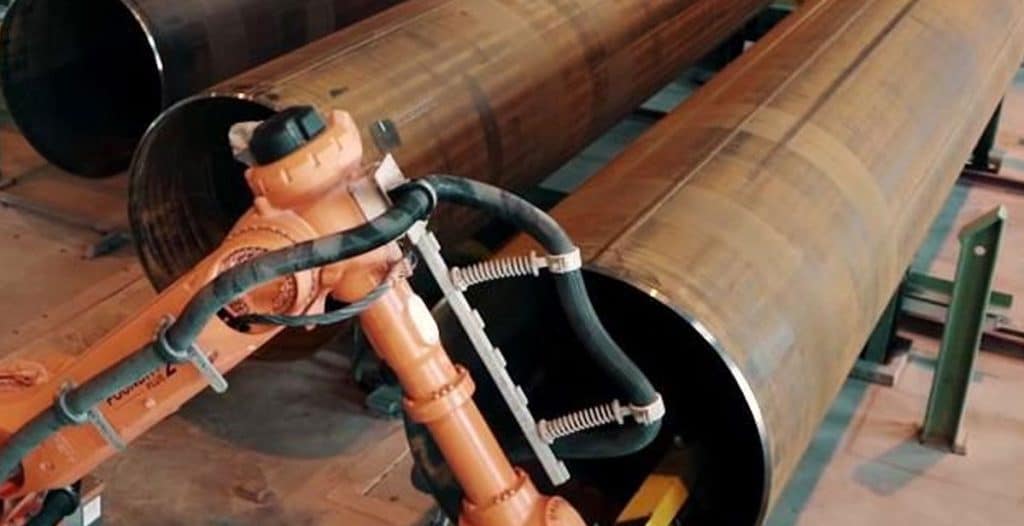
Pipe End Bevelling
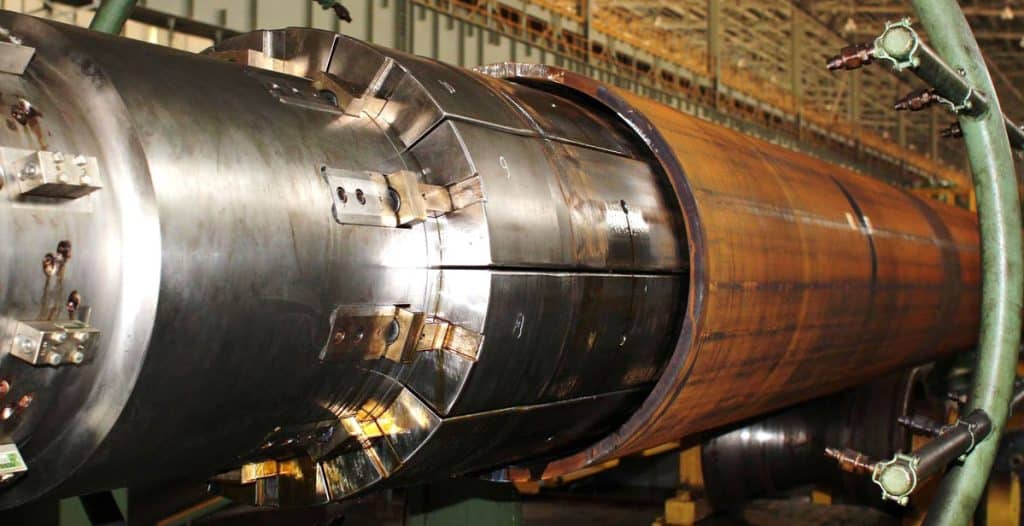
Mechanical Expansion
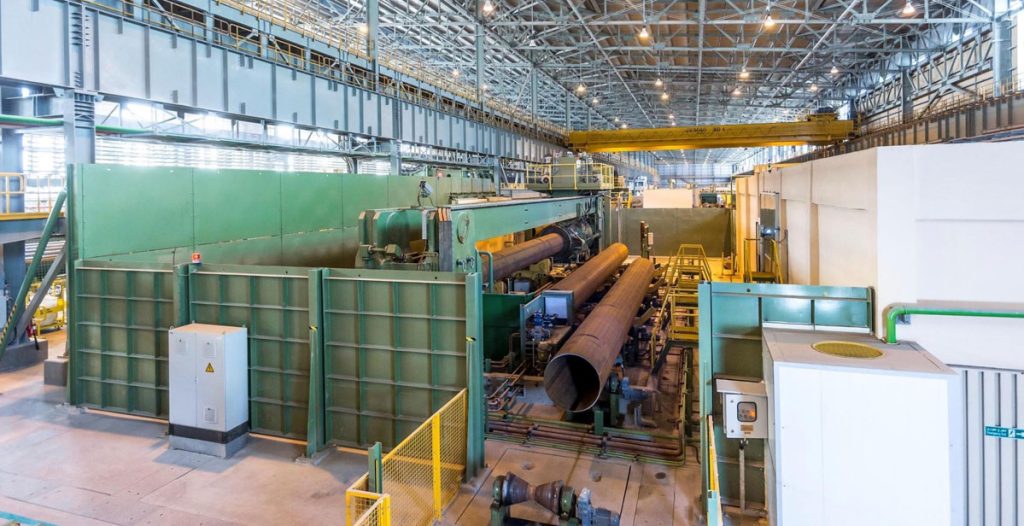
Hydrostatic Pipe Testing
Our Advantages For ASTM A671 EFW Steel Pipe
Complete Specifications
Good Quality
Fast Delivery
Quick Quotation
Accept Small Quantity Order
Complete Certificate
Technical Data For ASTM A671 EFW Steel Pipe
| Steel grade | C max | Si | Mn | P | S |
|---|---|---|---|---|---|
| A45 | 0.17 | / | 0.98 | 0.035 | 0.035 |
| A50 | 0.22 | / | |||
| CA55/A55 | 0.28 | / | |||
| B55 | 0.20 | 0.13~0.45 | |||
| CB60/B60 | 0.24 | ||||
| CB65/B65 | 0.28 | ||||
| CB70/C70 | 0.31 | 1.30 | |||
| C55 | 0.18 | 0.55-0.98 | |||
| CC60/C60 | 0.21 | ||||
| CC65/C65 | 0.24 | 0.79-1.30 | |||
| CC70/C70 | 0.27 |
| Steel Grade | Yield point (N/mm2) max | Tensile Stregth (N/mm2)max | Elongation (%) |
|---|---|---|---|
| A45 | 165 | 310~450 | 30 |
| A50 | 185 | 345~485 | 28 |
| A50 | 185 | 345~485 | 28 |
| CA55/A55 | 205 | 380~515 | 27 |
| B55 | 205 | 380~515 | 27 |
| CB60/B60 | 220 | 415~550 | 25 |
| CB65/B65 | 240 | 450~585 | 23 |
| CB70/B70 | 260 | 485~620 | 21 |
| C55 | 205 | 380~515 | 27 |
| CC60/C60 | 220 | 415~550 | 25 |
| CC65/C65 | 240 | 450~585 | 23 |
| CC70/C70 | 260 | 485~620 | 21 |
| Class | Heat Treatment on Pipe Section see: | Radiography, | Elongation (%) |
|---|---|---|---|
| see Section | Pressure | 310~450 | 30 |
| Test, see : | 185 | 345~485 | 28 |
| 10 | none | none | none |
| 11 | none | 9 | none |
| 12 | none | 9 | 8.3 |
| 13 | none | none | 8.3 |
| 21 | stress relieved, see 6.3.1 | none | none |
| 21 | stress relieved, see 6.3.1 | 9 | none |
| 22 | stress relieved, see 6.3.1 | 9 | 8.3 |
| 23 | stress relieved, see 6.3.1 | none | 8.3 |
| 31 | normalized, see 6.3.2 | none | none |
| 31 | normalized, see 6.3.2 | 9 | none |
| 32 | normalized, see 6.3.2 | 9 | 8.3 |
| 33 | normalized, see 6.3.2 | none | 8.3 |
| 40 | normalized and tempered, see 6.3.3 | none | none |
| 43 | normalized and tempered, see 6.3.3 | 9 | none |
| 43 | normalized and tempered, see 6.3.3 | 9 | 8.3 |
| 43 | normalized and tempered, see 6.3.3 | none | 8.3 |
| 50 | quenched and tempered, see 6.3.4 | none | none |
| 51 | quenched and tempered, see 6.3.4 | 9 | none |
| 52 | quenched and tempered, see 6.3.4 | 9 | 8.3 |
| 53 | quenched and tempered, see 6.3.4 | none | 8.3 |
| 60 | normalized and precipitation heat none treated | none | none |
| 61 | normalized and precipitation heat none treated | 9 | none |
| 62 | normalized and precipitation heat none treated | 9 | 8.3 |
| 63 | normalized and precipitation heat none treated | none | 8.3 |
| 70 | normalized and precipitation heat none treated | none | none |
| 71 | normalized and precipitation heat none treated | 9 | none |
| 72 | normalized and precipitation heat none treated | 9 | 8.3 |
| 73 | normalized and precipitation heat none treated | none | 8.3 |
| Pipe Grade | Type of Steel | ASTM Specification | |
|---|---|---|---|
| No. | Grade / Class / Type | ||
| CA 55 | plain carbon | A285/A285M | Gr C |
| CB 60 | plain carbon, killed | A515/A515M | Gr 60 |
| CB 65 | plain carbon, killed | A515/A515M | Gr 65 |
| CB 70 | plain carbon, killed | A515/A515M | Gr 70 |
| CC 60 | plain carbon, killed, fine grain | A516/A516M | Gr 60 |
| CC 65 | plain carbon, killed, fine grain | A516/A516M | Gr 65 |
| CC 70 | plain carbon, killed, fine grain | A516/A516M | Gr 70 |
| CD 70 | manganese-silicon, normalized | A537/A537M | Cl 1 |
| CD 80 | manganese-silicon, quenched and tempered | A537/A537M | Cl 2 |
| CF 65 | nickel steel | A203/A203M | Gr A |
| CF 70 | nickel steel | A203/A203M | Gr B |
| CF 65 | nickel steel | A203/A203M | Gr D |
| CF 70 | nickel steel | A203/A203M | Gr E |
| CG 100 | 9 % nickel | A353/A353M | |
| CH 115 | 9 % nickel | A553/A553M | Type 1 |
| CJA 115 | alloy steel, quenched and tempered | A517/A517M | Gr A |
| CJB 115 | alloy steel, quenched and tempered | A517/A517M | Gr B |
| CJE 115 | alloy steel, quenched and tempered | A517/A517M | Gr E |
| CJF 115 | alloy steel, quenched and tempered | A517/A517M | Gr F |
| CJH 115 | alloy steel, quenched and tempered | A517/A517M | Gr H |
| CJP 115 | alloy steel, quenched and tempered | A517/A517M | Gr P |
| CK 75 | carbon-manganese-silicon | A299/A299M | Gr A |
| CP85 | alloy steel, age hardening, quenched and precipitation heat treated | A736/A736M | Gr A, Class 3 |
It is mainly used for oil and gas transportation pipelines.
Frequently Asked Questions
Here are some common questions and answers. If you still have questions, don’t hesitate to contact us.
1. What is ASTM A671?
ASTM A671 grade covers standard specifications for EFW pipe, which have a filler metal added. The ASTM A671 Pipe is made up of main constituents of 0.98 Manganese, 0.25-carbon max, 0.64 molybdenum, and 0.45 Silicon. They are produced with the help of high-quality plates having excellent strength and toughness.
2. What’s the difference between ASTM A671 and ASTM A672?
A671 and A672 are EFW (Electric-Fusion Welded) Carbon Steel Pipes used for atmospheric and lower temperatures applications (A671) and high-pressure service at moderate temperatures (A672). As mentioned above, A671 is used for atmospheric and lower temperature application and A672 is used for high-pressure service applications at moderate temperature. However, if we compare the details e.g. A672 Gr.C60 & A671 Gr. CC60; the raw material plate used is same for both pipes & final mechanical properties are same. Heat treatment is same. The only difference between the 2 grades is only in the testing requirements. A672 requires weld sample drawn from a 500ft length of pipe and allows you to double the samples in case, original sample fails. A671 requires weld sample drawn from a 200ft length of pipe with no provision for a rejected weld.
3. What is ASTM A671 steel used for?
ASTM A671 is used in a variety of applications where mild-temperature and atmospheric conditions are present, such as water supply systems, sewer systems, industrial piping, cooling water systems, and more. It is not intended for high-pressure or high-temperature applications.
4. What are the properties of ASTM A671?
The properties of ASTM A671 steel pipes can vary depending on the specific grade and class of the pipe. ASTM A671 is a standard specification that covers a range of grades and classes of electric-fusion-welded steel pipes for atmospheric and lower-temperature service. Here are some of the key properties associated with ASTM A671 pipes:
Mechanical Properties:
Tensile Strength: ASTM A671 pipes exhibit varying tensile strength properties depending on the grade and class. Tensile strength measures the material’s ability to withstand axial loads or stretching forces.
Yield Strength: Yield strength is the amount of stress at which the material undergoes plastic deformation. Like tensile strength, it varies based on the grade and class.
Elongation: ASTM A671 pipes typically have specified elongation values, which indicate how much the material can stretch before it breaks. Elongation is expressed as a percentage of the original length.
Chemical Composition: The chemical composition of ASTM A671 pipes varies depending on the grade and class. Common elements found in these pipes include carbon, manganese, phosphorus, sulfur, silicon, and trace amounts of alloying elements like molybdenum, chromium, and nickel in some low-alloy grades.Impact Properties: Some grades and classes of ASTM A671 pipes are subjected to impact testing to determine their resistance to brittle fracture, especially at lower temperatures. This is crucial for applications in colder environments.
Hardness: ASTM A671 pipes may have specified hardness requirements, which can affect their resistance to wear and abrasion. Hardness is typically measured using the Rockwell or Brinell scale.
Weldability: ASTM A671 pipes are designed for electric-fusion welding, and their weldability is an important property. Proper welding techniques and procedures should be followed to ensure the integrity of the welded joints.
Corrosion Resistance: The corrosion resistance of ASTM A671 pipes is generally good, but it can vary depending on the specific alloying elements and environmental conditions. Additional coatings or treatments may be necessary for highly corrosive environments.
5. What's the material of ASTM A671?
5.What’s the material of ASTM A671?
The materials used for ASTM A671 pipes are typically carbon and low-alloy steels. The specific material and grade used depend on the intended application and the service conditions. Some of the common steel materials used for ASTM A671 pipes include:Carbon Steel: ASTM A671 pipes made from carbon steel are suitable for a wide range of applications where moderate strength and corrosion resistance are required. Common carbon steel grades used include A671 CC60, A671 CC65, A671 CC70, and others.
Low-Alloy Steel: Low-alloy steels contain small amounts of alloying elements such as manganese, molybdenum, chromium, and nickel to improve mechanical properties. ASTM A671 low-alloy steel pipes are used in applications that require higher strength and toughness compared to carbon steel. Common low-alloy steel grades used include A671 C70, A671 C75, and A671 C80.
6. How to determine the wall thickness for an ASTM A671 pipe?
To determine the appropriate wall thickness for an ASTM A671 pipe for a specific application, you should consult the ASTM A671 standard and consider factors such as:
Service Conditions: The operating temperature and pressure of the piping system will influence the required wall thickness. Higher pressures and temperatures may require thicker-walled pipes to withstand the stress.
Fluid Transported: The nature of the fluid being transported, including its corrosiveness and potential for erosion, can impact the selection of wall thickness to ensure durability and prevent leaks.
Code and Regulatory Requirements: Depending on the industry and jurisdiction, there may be specific code or regulatory requirements that dictate the minimum wall thickness for certain applications.
Safety Factors: Engineers often apply safety factors to account for uncertainties and variations in service conditions, which can influence the selection of wall thickness.
Design Standards: The design standards and engineering calculations for a particular project will provide guidance on the required wall thickness to meet safety and performance criteria.
Featured Case For ASTM A671 EFW Steel Pipe

API 5L PSL2 X70M LSAW Pipe
- Size: 914.4*22.23*12000MM
- Country: Agentina
- Client say: This is not our first cooperation, Longma’s product quality and service has always been very good, which is the reason why we continue......

APL 5L PSL1 B LSAW Pipe
- Size: 813*10mm
- Country: Georgia
- Client say: The delivery time I asked for was very short, but they always finished on time. They have very strong organizational and coordination skills. ......
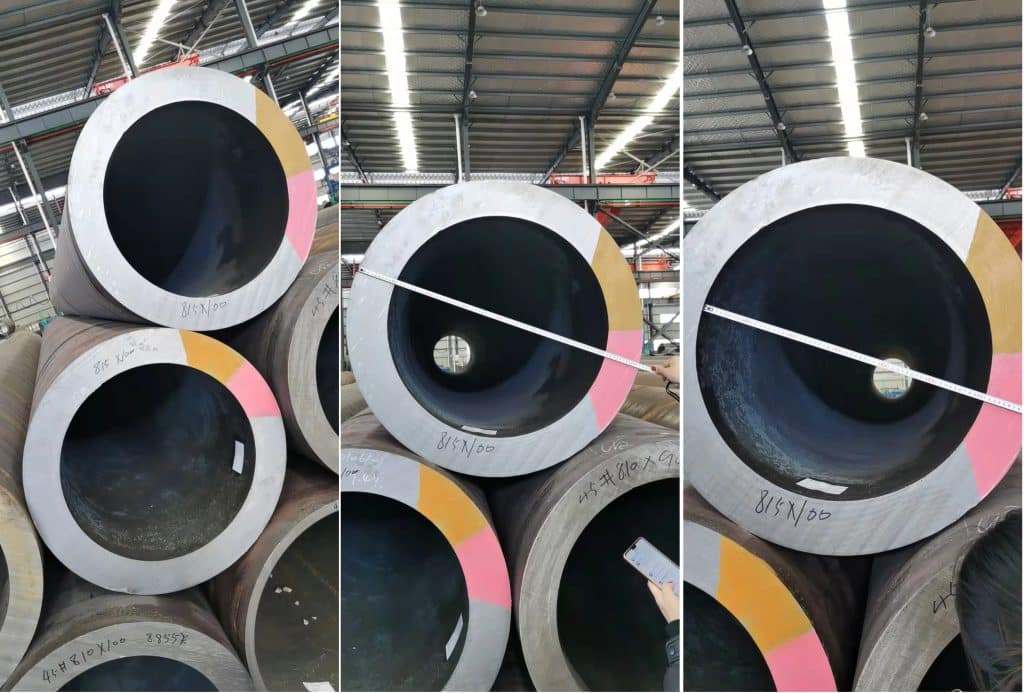
EN10210 S355J2H Hollow Section
- Size: 815mm*100mm
- Country: Poland
- Client say: The steel pipes I purchased are used for equipment manufacturing and special engineering, which have extremely strict requirements for product quality. The production......

ASTM A691 1-1/4Cr Cl22 EFW Steel Pipe
- Size: 508*20.62mm
- Country: Singapore
- Client say: Although our order quantity is not large, Longma has been very diligent to help us complete the production and provide relevant documents.
Request Free Quote
Get In Touch
How Can We Help?
Longma experienced engineers are here to guide you through every critical step in your project.
Please do not hesitate to contact us.

